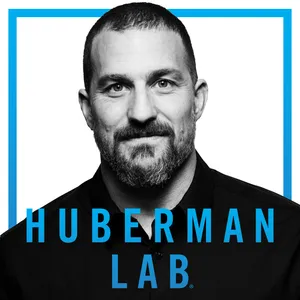Unlearn Negative Thoughts & Behaviors Patterns | Dr. Alok Kanojia
Huberman Lab
Dr. Alok Kanojia, MD, MPH ("Dr. K"), is a Harvard-trained psychiatrist and expert in both Eastern and Western medicine to improve mental health. He explains tools for unlearning maladaptive thoughts and behavior patterns and for making behaviors that better mental and physical well-being more reflexive in work, relationships and daily life. We also discuss ways to resolve trauma, build stress tolerance, increase intrinsic motivation and even change temperament. We also discuss how social media, gaming and online dating shape our identity and perceptions and how to navigate them healthily.
Thank you to our sponsors
AG1: https://drinkag1.com/huberman
Lingo: https://hellolingo.com/huberman
Joovv: https://joovv.com/huberman
Function: https://functionhealth.com/huberman
Eight Sleep: https://eightsleep.com/huberman
Timestamps
(00:00:00) Alok Kanojia (Dr. K)
(00:03:09) Internet, Computer Games; Academic Pressure
(00:07:11) Millennials & Self-Awareness, Hijacking Mental Health Language
(00:13:24) Sponsors: Lingo & Joovv
(00:16:06) Personality & Individual Road Maps, Misdiagnosis
(00:22:02) Ambiguity, Flirting, Social Skills Decline, Uncertainty Tolerance
(00:26:06) Dating in the Internet Age, Cognitive Bias
(00:30:39) Healthy Distress Tolerance, Tool: How to Feel Your Feelings
(00:39:58) Sponsor: AG1
(00:40:49) Expectations vs Internal Desire Roadmap, Western vs Eastern Theory of Mind, Ego
(00:50:35) Sense Organs, Comparison & Proving Oneself, Internal Drive
(00:59:22) Internet, Ego, "Teflon Buddha", Tool: Dealing with Criticism
(01:10:36) Observing One's Mind, Meditation, Psychedelics
(01:11:59) Sponsor: Function
(01:13:46) Tool: Shunya "Void" Meditation & Resilience
(01:24:02) External Reminders, Environment; Men & Emotional Regulation
(01:30:04) Samskara, Yoga Nidra, Trauma & Learning, Shunya & Personal Compass
(01:39:15) Yoga Nidra, Channeling Divinity, Genius
(01:42:30) Sponsor: Eight Sleep
(01:43:48) Breathwork Practices; Meditation Science, Self-Esteem & Belief Change
(01:53:40) Liminal States, Meditation Types & Benefits; Western & Eastern Balance
(02:01:50) Understanding Ego & Perception; AI & Narcissism, Psychosis
(02:14:07) Tool: Healthy Social Media Use, When To Not Use, Normal Standards
(02:18:38) Social Media & Looks Obsession, Purpose, Charisma
(02:24:18) Young Men Falling Behind?, Male Support, Suicide; Men in Relationships
(02:30:36) "Stuck" Young Men, Failure to Launch, Tool: Motivation & Understanding Oneself
(02:39:03) Pornography, Erectile Dysfunction, Emotions, Addiction; Relationships
(02:44:21) Men & Love, Looksmaxxing, Rejection, Partner Characteristics, Tool: Walk Before Dates
(02:55:12) Exploring Practices, Meditation, Breathwork
(03:01:39) Spirituality, Personal Exploration; Acknowledgements
(03:06:12) Zero-Cost Support, YouTube, Spotify & Apple Follow, Reviews & Feedback, Sponsors, Protocols Book, Social Media, Neural Network Newsletter
Disclaimer & Disclosures
Learn more about your ad choices. Visit megaphone.fm/adchoices








